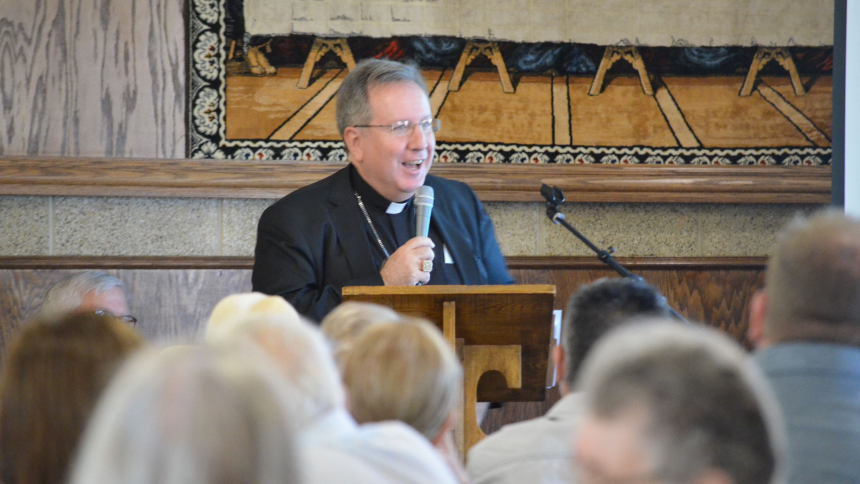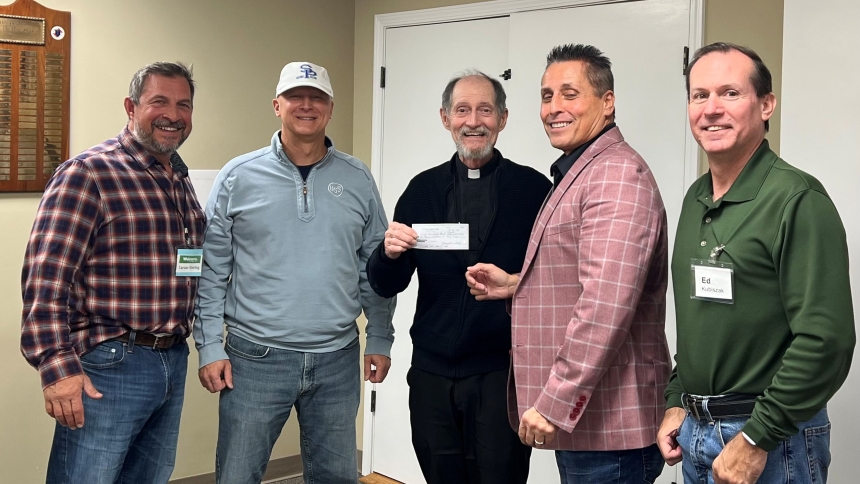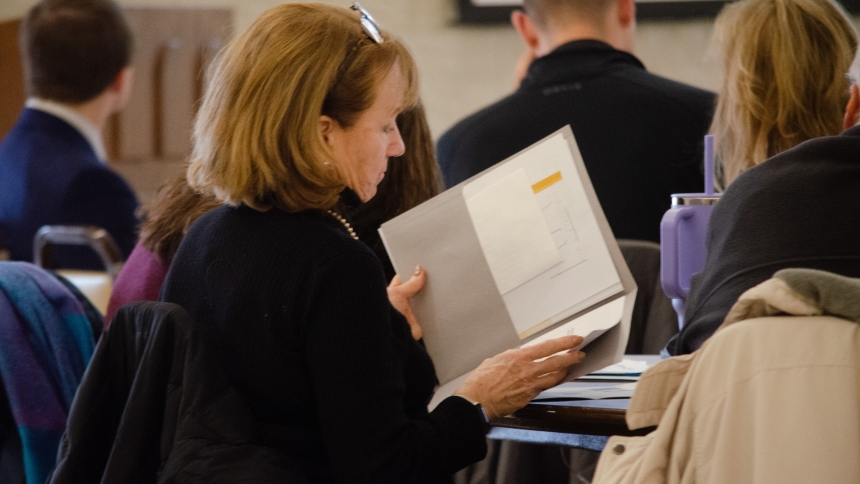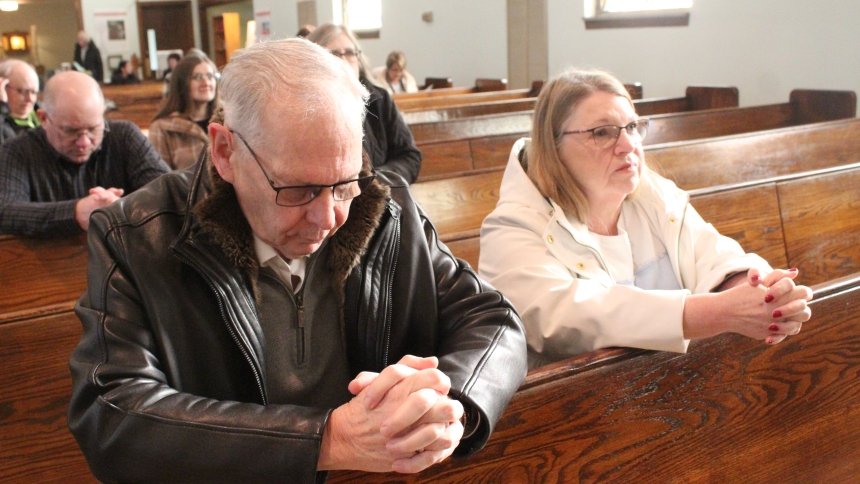
JOURNEYING TOGETHER
Diocesan Pastoral Council walks through first steps of universal synod
BY ERIN CISZCZON
Northwest Indiana Catholic
“It is precisely this path of synodality which God expects of the Church of the third millennium. What the Lord is asking of us is already in some sense present in the very word ‘synod.’ Journeying together – laity, pastors, the Bishop of Rome – is an easy concept to put into words, but not so easy to put into practice.” – Pope Francis
To reform the Catholic Church in accordance with the teachings of the Second Vatican Council, Pope Francis has called for a synod entitled, “For a Synodal Church: Communion, Participation and Mission.” In an effort to involve the whole Church, this next Synod of Bishops will not only be celebrated in the Vatican but in each particular Church of the five continents, following a three-year itinerary divided into three phases: diocesan, continental and universal.
Members of the Diocesan Pastoral Council arrived at Our Lady of Guadalupe in East Chicago on Sept. 18 ready to start the Diocese of Gary on its path through the next synod journey.
Following a celebration of Mass, Bishop Robert J. McClory began the meeting by reflecting on the history of the Diocese of Gary. He reminded those in attendance that the 2017 diocesan Synod, led by Bishop Donald J. Hying and others, led to the development of a pastoral letter entitled “Go Make Disciples.”
Three years later, in February 2020, when Bishop McClory became the fifth bishop of the Diocese of Gary, he chose the motto “Preach Jesus as Lord,” or “We proclaim Jesus as Lord.” Bishop McClory took time to read aloud the words shared with him, via the Apostolic Nuncio, from Pope Francis on the day of his ordination as bishop.
“The Holy Father wants a missionary Church and his holiness is counting on you to lead the people of the Diocese of Gary to be both disciples and missionaries,” he said.
Bishop McClory called this letter “beautiful words of encouragement to continue this work of forming disciples who stay close but disciples who are (also) missionaries – who are sent – to share the Good News of Jesus.”
The overall mission for the Diocese of Gary, Bishop McClory said, remains the same – to go make disciples – fulfilling that mission of the 2017 Synod which calls into focus the commission by Jesus. He explained that it’s important to focus on that goal, but it’s also important to focus on what may be important now, in the next three to 12 months.
“The first (goal) is, and we are still in the midst of this, to survive and thrive in the midst of COVID. That is a unique challenge that we need to be prepared to navigate our way through. But (as I stated) a year ago, (we also need) ‘To build upon the synod and take it to the next level,’” Bishop McClory said.
The guidelines for the universal synod are to be applied differently according to the state of each diocese. Therefore, rather than going through an extensive synod process as was done in 2017, the Diocese of Gary will conduct a series of follow up conversations to examine the discoveries made in 2017.
“This is an opportunity not to just respond to the Holy Father’s call for what we are going to do in 2021 and beyond, but to build upon our synod and pray God take it to the next level,” said Bishop McClory.
Deacon Dan Lowery, of St. Mary, Crown Point, who is serving as the Diocese of Gary liaison during the synod process, explained what the pope is requesting of the Church.
“He wants a synodality, our way of being a Church, but beyond that he wants us to reflect deeply on the way the Church fulfills its mission in this particular moment, in this particular time,” he said.
Why did Pope Francis establish this universal synod at this particular time? Deacon Lowery shared that Pope Francis is deeply concerned about the impact of the pandemic on society and on culture and wants to promote the revitalization of the Church.
“Initially after the pandemic (the pope) said it seemed to bring people together, but this broke down rather quickly, and he sees in society today and he sees in culture a movement toward inequity and a movement toward inequality and that is of deep concern,” he explained.
The term “synodality,” comes from two Greek words that roughly mean “common road.” Deacon Lowery said that synodality deals with governance, consultative processes and ecclesial structures but it is much more.
“It’s a particular style, a particular way of being Church, a particular way of journeying together. Pope Francis suggests we need to relearn this style,” he said.
After a few instructions, the first round of table discussions began. Participants representing parishes of the Diocese of Gary listened to each person at their table share their experience with Synod 2017. A prepared list of questions was shared to help guide their thoughts, including: “What joys did this experience evoke?”, “What difficulties and obstacles were encountered?” and “What insights were elicited?”.
Each table was asked to come up with just two points that the participants felt needed to be carried further into the synod process. A representative from each table came forward to share those ideas using the microphone. “Regroup and revisit the 2017 outcomes,” “To be open to the changes that have occurred since 2017,” “The laity’s contribution to the process” and “To expand participation groups” were a few of the comments mentioned.
Sandra Maddy acknowledges her parish, St. Ann in Gary, has an aging population with not many new families joining the church. She wanted to be part of the day’s discussion because the parish offers a lot of services to the community.
“I thought if I could get some ideas as to how to revitalize the church and bring people in, that would help keep those other programs going,” she said.
Elaine Hermann, parishioner at St. Thomas More in Munster, said she wanted to be involved with the universal synod, “because I believe in (the Church), and I see the changes that have been happening ... where people are not coming back.”
Hermann said she feels it is very important “that we get together, and all find a way to try and get some of these people back and get them active again. I know they are going to want to do it again eventually, but I just feel it's critical when I see the church isn’t that full, and I think it’s sad. And I think of the young kids growing up and my grandkids.”
In the second half of the Diocesan Pastoral Council meeting, Deacon Lowery shared some of the “signs of the times” concerning declining affiliation, Mass participation and participation in the sacraments. The number of families registered in parishes in the Diocese of Gary fell by 17.7% between 2013 and 2019. The overall trend in family registrations is confirmed by the overall trend in Sunday Mass attendance. Across the Diocese, weekly Mass attendance fell by 17.2% from 2013 through 2019, one year before the onset of the pandemic, and by 58.4% over the eight-year period ending in 2020.
Table groups were then asked to follow the same procedure as before to discuss: “What joys – if any – do these signs of the times evoke?”, “What difficulties and obstacles do they present?” and “What is being asked of us now?”.
Bishop McClory said that while the numbers can be sobering “one does not despair” but uses it instead to keep focused on the urgency. He also shared his thoughts on missionary discipleship starting with words of St. John Paul II in 1989:
“Now, among these many discoveries there must not be lacking one that is of fundamental importance for every human being: the personal discovery of Jesus Christ. Discovering Christ, always again and always more fully, is the most wonderful adventure of our life,” the bishop recited.
This vision, the bishop reflected, is one that casts Christian life as a heroic life that will bring joys, twists and turns and excitement. He reminded those in attendance that prayer and hard work are required of all disciples along with a commitment to ongoing conversion.
“The best programs and plans in the world without being nourished by this prayerful engagement with the Lord will result in this drying up,” he said.
Although it can be tempting to dwell on the negative, Bishop McClory encouraged the faithful to keep the invitation to enter into a personal relationship with Jesus welcoming, healing and joyful.
The meeting of the Diocesan Pastoral Council followed a meeting of the diocesan priests that took place on Sept. 15, which began the universal synod discussion for our diocese. Deacon Lowery shared there are plans to reach out into the diocese further through focus groups that would include youth and young adults, women’s religious and others into the synod discussions.
Pope Francis is scheduled to formally open the synod process at the Vatican on Oct. 9-10, and the bishop of every diocese is asked to open the process in his diocese on Oct. 17. The Diocese of Gary will celebrate with a special Mass on that Sunday at the Cathedral of the Holy Angels in Gary. The diocesan phase of the universal synod, which runs until April 2022, will focus on listening to and consulting with the people of God.



